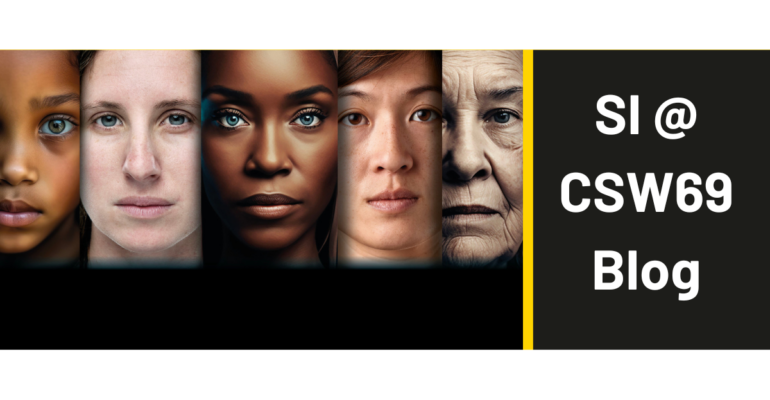Blog by Joseph Mason SI Advocacy and Communications Coordinator
The UN Working Group to End Homelessness hosted a side event on Inclusive Social Policies to Achieve Gender Equality, Women’s Empowerment, and End Homelessness, held during CSW69. Bringing together experts, policymakers, and advocates, the session examined the disproportionate impact of homelessness on women and girls and explored concrete solutions to ensure that gender-responsive policies are at the forefront of global efforts. Against the backdrop of the Beijing+30 review and the push for accelerated progress on the Sustainable Development Goals (SDGs), the discussion sought to reinforce commitments to ending homelessness as a gendered issue and advancing women’s rights worldwide.
Opening Remarks
The session opened with an overview of the intersection between gender inequality and homelessness, highlighting the need for inclusive policies to tackle this as a growing crisis. It was noted that homelessness among women is often hidden due to temporary housing arrangements, overcrowding, and unsafe living conditions. The speakers stressed the importance of addressing the root causes of homelessness, including discrimination, economic insecurity, and lack of access to social protections.
Gender and Homelessness: A Systemic Issue
Dr. Lydia Stazen, Executive Director of the Institute for Global Homelessness, emphasised the various forms of homelessness that women experience, from street homelessness to inadequate temporary housing. She pointed out that women facing homelessness are often at greater risk of sexual exploitation and abuse. Dr. Stazen called for trauma-informed care and gender-sensitive policies to ensure that women receive the tailored support they need to achieve stable housing.
A Government Perspective: Ireland’s Role
Ambassador Cronin of the Permanent Mission of Ireland to the UN provided insights into Ireland’s commitment to addressing gender inequality and homelessness. She highlighted the political declaration marking the 30th anniversary of the Beijing Platform for Action, which acknowledges the feminisation of poverty. She stressed the need for greater investment in shelters and emergency housing and called for a more integrated approach to social protection.
Intersectionality and Policy Challenges
Sister Jane Quinn, Executive Director of Unanima International, explored the links between gender inequality, the feminisation of poverty, and homelessness. She noted that while the 1995 Beijing Declaration made significant progress in advancing gender equality, persistent issues such as violence against women and girls and child marriage continue to undermine women’s rights. She called for investment in social protections, digital inclusion, and stronger policy enforcement to ensure women’s empowerment beyond rhetoric.
The Reality of Land and Housing Rights: A Ugandan Perspective
Dorothy B. from Women and Habitat Africa focused on the challenges women face in Uganda regarding land and housing rights. She explained that cultural norms often prevent women from inheriting or owning land, exacerbating their risk of homelessness. Despite progressive legal reforms, implementation gaps remain, leaving many women vulnerable. She stressed the need for legal education, advocacy campaigns, and partnerships between grassroots organisations and policymakers to secure women’s housing rights.
The Power of Women in Policy and Governance
Ms. Liana Harmony, Chair of the NGO Committee on Social Development, addressed the exclusion of women from decision-making spaces. She argued that gender-neutral policies often fail women due to systemic discrimination in employment, financial access, and property rights. She advocated for the inclusion of women with lived experience in policymaking, the implementation of gender-sensitive financial incentives, and stronger legal protections for women experiencing homelessness.
Q&A: Addressing Stigma and Systemic Barriers
The discussion concluded with a Q&A session, where panellists tackled key issues such as the feminisation of poverty, intersectionality in homelessness, and the stigma surrounding social security benefits. Participants noted that harmful narratives around poverty often frame homelessness as a personal failing rather than a systemic issue. They called for a shift in language and policy to centre dignity and respect for those in need of support.
Closing Remarks and Call to Action
The session ended with a call for urgent and sustained action.
Key takeaways included:
- Stronger inclusion of women in policymaking to ensure that solutions are informed by lived experiences.
- Greater investment in social protection systems that integrate housing, legal support, and economic empowerment.
- Global partnerships and increased funding to scale up gender-sensitive housing initiatives.
As one speaker aptly quoted The Revd. Desmond Tutu, “I am not an optimist, I am a prisoner of hope.” This powerful message encapsulated the spirit of the discussion—progress is possible, but it requires sustained commitment and action to ensure a future where women and girls are empowered, protected, and housed.

